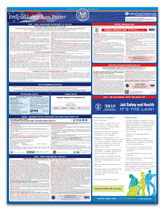Pages
Stay In Touch
More
Minimum-Wage.us is not affiliated with the United States Department of Labor.
The federal minimum wage is the minimum hourly wage an employee in the United States can be paid for their services. The federal minimum wage is set by a congressional act, has been $7.25 per hour since July 2009. Prior to the last 2009 minimum wage raise, the federal minimum wage was $6.55. As recently as 2007, the federal minimum wage was $5.15 per hour.
Fourty-five of the fifty states also have their own, state-specific minimum wage rates. Federal law handles state minimum wages by declaring that the higher of the state minimum wage or the federal minimum wage is to be used as the effective minimum wage.
Therefore, employees who work in a state with a minimum wage higher than $7.25 are entitled to receive the higher state minimum wage. Employees who live in a state with no minimum wage laws, or an outdated minimum wage that's lower then the federal minimum wage, are entitled to receive the $7.25 federal minimum wage rate.
While many states have a minimum wage rate that is automatically adjusted every year for inflation, the federal minimum wage is only raised when congress explicitly passes a bill to raise the minimum wage. The last time such a bill was passed was the Fair Minimum Wage Act of 2007, which raised the minimum wage from $5.55 per hour to $7.25 per hour in three increments.
Recently, President Barack Obama has called for the federal minimum wage to be raised to $9.00 per hour and indexed to inflation in order to keep up with rising costs of living. While the Presiden's announcement has rekindled the debate over whether to raise the minimum wage, no bill actually raise the minimum wage has yet been introduced into Congress.
Raising the minimum wage is a politically polarizing issue - Democrats generally support raising the minimum wage as a way to help raise the working poor out of poverty and stimulate the economy, while Republicans claim that raising the minimum wage hurts small business' bottom lines and has a negative affect on the economy. Because of the current political climate, it remains to be seen whether the Minimum Wage will successfully be raised in the near future.
The Fair Labor Standards Act includes a variety of exemptions to the Federal Minimum Wage and other labor laws, like overtime pay.
All employers are required by the Fair Labor Standards Act to post an up-to-date minimum wage poster in a conspicuous location in the workplace. Other posters are also required by the FLSA, and many states require a state minimum wage poster to be displayed as well.

Federal All-In-One Labor Law Poster
This professional federal labor law poster includes all of the posters needed to satisfy both Federal minimum wage, FLSA and labor law regulations.
This poster has been updated for 2025, including the recent FMLA poster update. Professionally printed and laminated.
$12.95 eachFree federal minimum wage posters: You can download a free printable copy of the latest Federal Minimum Wage Poster below. Remember, posters are required for full compliance with state and federal laws.
If you have any questions about the minimum wage or overtime law, you can contact the Department of Labor's Wage and Hour division. They will be able to answer your questions, and can help you if your employer has illegally failed to pay you the minimum wage or correct overtime pay.
If you need to contact your state's Department of Labor instead, you can find their address and phone number on your state's state minimum wage page.
The Department of Labor's hours are Monday-Friday 8 a.m. to 8 p.m. Eastern Time.
U.S. Department of Labor
Online Contact Form:
http://www.dol.gov/whd/contactform.aspLocate an Office:
http://www.dol.gov/whd/america2.htm